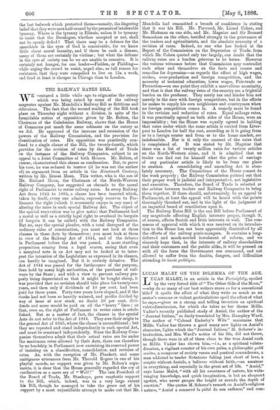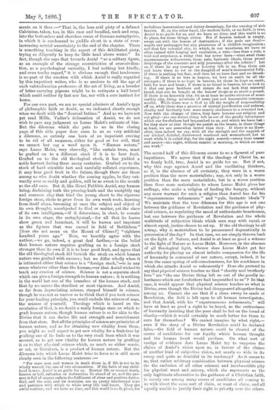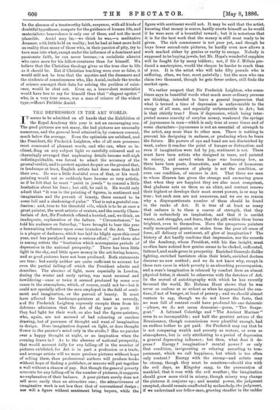LUCAS MALET ON THE DILEMMA OF THE AGE.
TITCAS MALET, in an article in the Fortnightly, spoiled ,4 by the very forced title of " The Other Side of the Moon," —why do so many of our best writers crave so for a sensational title P it spoils the effect of what they write as much as an orator's screams or violent gesticulations spoil the effect of what he says,—gives us a strong and telling invective on spiritual valetudinarianism, for which she takes as her theme Mdlle. Vadier's recently published study of A.miel, the author of the "Journal Intime," so finely translated by Mrs. Humphry Ward. The author of "Colonel Enderby's Wife" maintains that Mdlle. Vadier has thrown a good many new lights on .A.miel's character, lights which the "Journal Intime," M. Scherer's in. troduction, and Mrs. Ward's notice of his life, did not throw, though there were in all of them clues to the true Amiel such as Mille. Vadier has shown him,—i.e., as a spiritual valetu- dinarian, a vigilant counter of his own pulse, a philosophic petit maitre, a composer of society verses and poetical conundrums, a man addicted to tender flirtations falling just short of love, a sceptic without denials, a believer without faith,—an amateur in everything, and. especially in the great art of life. " Amiel," says Lucas Malet, "with all his sweetness of nature, his wide- ranging knowledge, and quick imagination, is but an eloquent egotist, who never gauges the height or sounds the depth of emotion." She quotes M. Scherer's remark on Amid's religious nature, " Amiel a conserv4 la OM de son enfance," and corn-
ments on it thus :—" That is, the lean arid piety of a defunct Calvinism, taken, too, in this case and bundled, neck and crop, into the bottomless and shoreless ocean of German metaphysics, in which it is condemned to paddle about in a state of ever- increasing mental uncertainty to the end of the chapter. There is something touching in the aspect of this debilitated piety, trying so diligently to keep its little head above water." In fact, though she says that towards Amiel "as a solitary figure, as an example of the strange eccentricities of over-civilisa- tion, as a psychological curiosity, I feel nothing but kindly, and even tender regard," it is obvious enough that tenderness is no part of the emotion with which Amiel is really regarded by this impatient writer, who is as anxious to rid the age of such valetudinarian professors of the art of living, as a breeder of letter.carrying pigeons might be to extirpate a half breed which could neither fly fast nor far, nor with a sure instinct for home.
For our own part, we are no special admirers of Amiel's type of philosophic faith or doubt, as we indicated clearly enough when we dealt with the "Journal Intime." And as we have not yet read Mlle. Vadier's delineation of Amiel, we do not wish to pass any judgment on Lucas Malet's estimate of him. But the dilemma which she puts to us in the closing page of this able paper does seem to us so very artificial a dilemma, so entirely one born of an impatient craving to be rid of all suspense, either for good or for evil, that we cannot but say a word upon it. "Human nature," says Lucas Malet, very shrewdly, "like certain trees, mast be grafted on to a different stock if it is to bear fruit. Grafted on to the old theological stock, it has yielded a noble harvest daring these many centuries. Grafted on to the stock of hard scientific fact and carefully collated experience, it may bear good fruit in the future, though there are those among us who doubt whether the coming apples, be they out- wardly ever so ruddy and golden, will be as sweet in the month as the old ones. But if, like Henri Fr4d4ric Amiel, any human being, disdaining both the pruning-knife and the unsightly rag and common clay that bind the young shoot to the vigorous foreign stem, elects to grow from its own weak roots, learning from itself alone, becoming at once the subject and object of its own thought, unsubjected to God or matter, yet the slave of its own intelligence,—if it determines, in short, to remain in its own stage, the metaphysical,—for all that its leaves show green and luxuriant, it will be barren and impotent as the fig-tree that was cursed in field of Bethlehem" [does she not mean on the Mount of Olives ?] "eighteen hundred years ago." Now, we heartily agree with the author,—we go, indeed, a great deal farther,—in the belief that human nature requires grafting on to a foreign stock stronger than its own if it is to bear good fruit, and agree that the old theological stock did furnish the stock on which human nature was grafted with success ; but we differ wholly when it is intimated either that science is a "foreign stock,"—is in any sense whatever other than the human,—or that Amiel wished to teach any evasion of science. Science is not a separate stock which can give a foreign strength to human nature ; it is nothing in the world but one of the branches of the human stock, and that by no means the sturdiest or most vigorous. And Amiel, so far from depreciating science, steeped himself in science, though he was not so narrow as to think that if you took science for your leading principle, you (mould exclude the science of man, the science of yourself. Theology which is based on the revelation of God, is no doubt a really foreign stem on which to graft human nature, though human nature is so far akin to the Divine that it can derive life and strength and nourishment from that stem. But all the principles of science are principles of human nature, and as for obtaining new vitality from them, you might as well expect to get new vitality for a fruit-tree by grafting one of its buds on to the very stock from which it was severed, as to get new vitality for human nature by grafting it on to that physical science which, as much as either music, or art, or literature, is a product of human nature. But the dilemma into which Lucas Malet tries to force us is still more clearly seen in the following sentences :—
"For sane men and women in truth there is, if life is not to be wholly wasted, but one of two alternatives. If the faith of our child- hood is true, Amiel is no guide for us. Eternal life or eternal death, heaven or hell, salvation or destruction lie ahead of us, and the pre- sent is full of urgent calls to the fulfilment of clear and positive duties. God, and the soul, and its destinies, are no pretty intellectual toys and pastimes with which to while away idle half-hours. They are awful verities ; and we have no time, and this world is no fit place, for melodious lamentations and dainty dreamings, for the nursing of sick fancies. If, on the other hand, the modern faith, or no-faith, is true, Amiel is no guide for us, and we have no time, and this world is no fit place, for these things either. For if heaven indeed is empty, swept oat with the bosom of destruction ' • if the gods are dead— angels and archangels but airy phantoms of a childish imagination; and that fair celestial city, to which, in our weariness, we have so often turned with longing and exultation, a ruin—less than a ruin, a. void and emptiness, a thing that has never been—what avail these supersensuous refinements, these pale, fantastic ideals, these proud despisings of the concrete and silly yearnings after the infinite ? Let us if there be any courage or honesty left in us, fling them out and leave them to rot on the dunghill of man's immemorial folly. If there is nothing but fact, well then let us have fact and no dream- ing. If there is no love in heaven, let love on earth be all the stronger ; if there is no hope in heaven, let there be hope on earth, both for man and beast; if there is no bread in heaven, let us look to it that our poor brothers and sisters do not lack that material bread, that can be bought at the bakers' shops at so much a pound. If there is no heavenly oity, let us at least be active citizens of some earthly city, living members of some just and honourable common- wealth. While there was a God to lift the weight of responsibility off us, while there was a promibe of eternal justification and redress, charity and brotherly love were merely obedience to a revealed law. Now with the change of times, they have become our religion and our glory—the one divine thing left us out of the goodly inheritance which our forefathers had bequeathed to us, and which we have lost : for they show us that though we perish as the beasts, in these things at least, we are somewhat better than they. If there is no Here- after, then indeed we cry, with all the strength and the anguish of our tricked, deluded, discrowned manhood and womanhood, Let us work while it is called day, for the night oometh—every hour nearer and nearer—the night, without sunrise or morning, in which no man can work."
The second half of this dilemma seems to us a figment of pure impatience. We agree that if the theology of Christ be, as we firmly hold, true, Amiel is no guide for us. But if not, why this rage against Arnie! and the vacillating thinkers, as if, in the absence of all certainty, they were in a worse position than the mere materialists ; nay, not only in a worse position than the mere materialists, but in a worse position than those mere materialists to whom Lucas Malet gives her suffrage, who make a religion of feeding the hungry, without any more warrant for such a religion than Amiel has for his " supersensuons refinements" and "pale, fantastic ideals"? We maintain that the true dilemma for this age is not one between the guidance of Revelation and the guidance of phy- sical science, as regulating the mood of enthusiastic beneficence, but one between the guidance of Revelation and the whole multitude of subjective ideals which men may with equal, or almost equal, justice choose to setup. If the old theology be all astray, why is materialism to be pronounced dogmatically in possession of the day? In that case, we are simply thrown back on the light of Nature, and Amiel is at least as good a witness to the light of Nature as Lucas Malet. Moreover, in the absence of all theological light, whence does Lucas Malet get her authority for placing an almost infinite compassion for the ills of humanity in command of our nature, except, indeed, it be from the same spring of self-consciousness, for his confidence in which she attacks Amiel so vehemently P Does she pretend to say that physical science teaches us that "charity and brotherly love" are "the one Divine thing left us out of the goodly in- heritance which our forefathers had bequeathed to us"? In that case, it would appear that physical science teaches us what is Divine, even though the Divine had disappeared altogether from among us. Cannot she see that if a clean sweep be made of Revelation, the field is left open to all human investigators, and that Amiel, with his " snpersensuous refinements," will have at least as good a right to be heard, as the enthusiasm of humanity insisting that the poor shall be fed on the bread of charity—which it would certainly be much better for them to earn for themselves ? We cannot imagine by what right,— even if the story of a Divine Revelation could be declared false,—the field of human nature could be cleared of the scores of candidates for our loyalty which human thought and the human heart would produce. On what sort of vestige of evidence does Lucas Malet try to suppress the claims of Amiel's vision upon us, in favour of the claims of another kind of subjective vision, not nearly so wide in its sweep and quite as doubtful in its tendency? As it seems to us, that rather arbitrary combination between physical science (to the exclusion of all other science) and inexhaustible pity for physical want and .misery, which she represents as the only legitimate alternative to the guidance of a Christian faith, is merely one among many scores of candidates all coming to us with about the same sort of claim, or want of claim, and all equally unable to justify their right to priority over the others. In the absence of a trustworthy faith, suspense, with all kinds of doubtful hypotheses, compete for the guidance of human life, and 'materialistic benevolence is only one of these, and not the most
Amiel may be,—we think be was,—a meditative dreamer, with little held on reality; but he had at least more hold on reality than many of those who, in their passion of pity, try to turn man into what, except under the influence of a dominant and passionate faith, he can never become,—a socialistic altruist who cares more for his fellow-creatures than for himself. We believe that the Christian theology gives us the true clue to life as it should be. But if Christian teaching were ever so false, it would still not be true that the mystics and the dreamers and the students of consciousness who, like Amiel, include the truths of science amongst their data for solving the problem of exist- ence, would be shut out. Even so, a benevolent materialist would have legs to say for himself than that "elegant egotist" who, in a very true sense, was a man of science of the widest type,—Henri Frederic Amiel.
















































 Previous page
Previous page